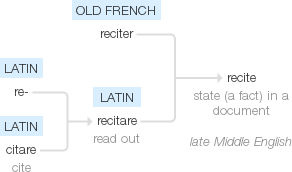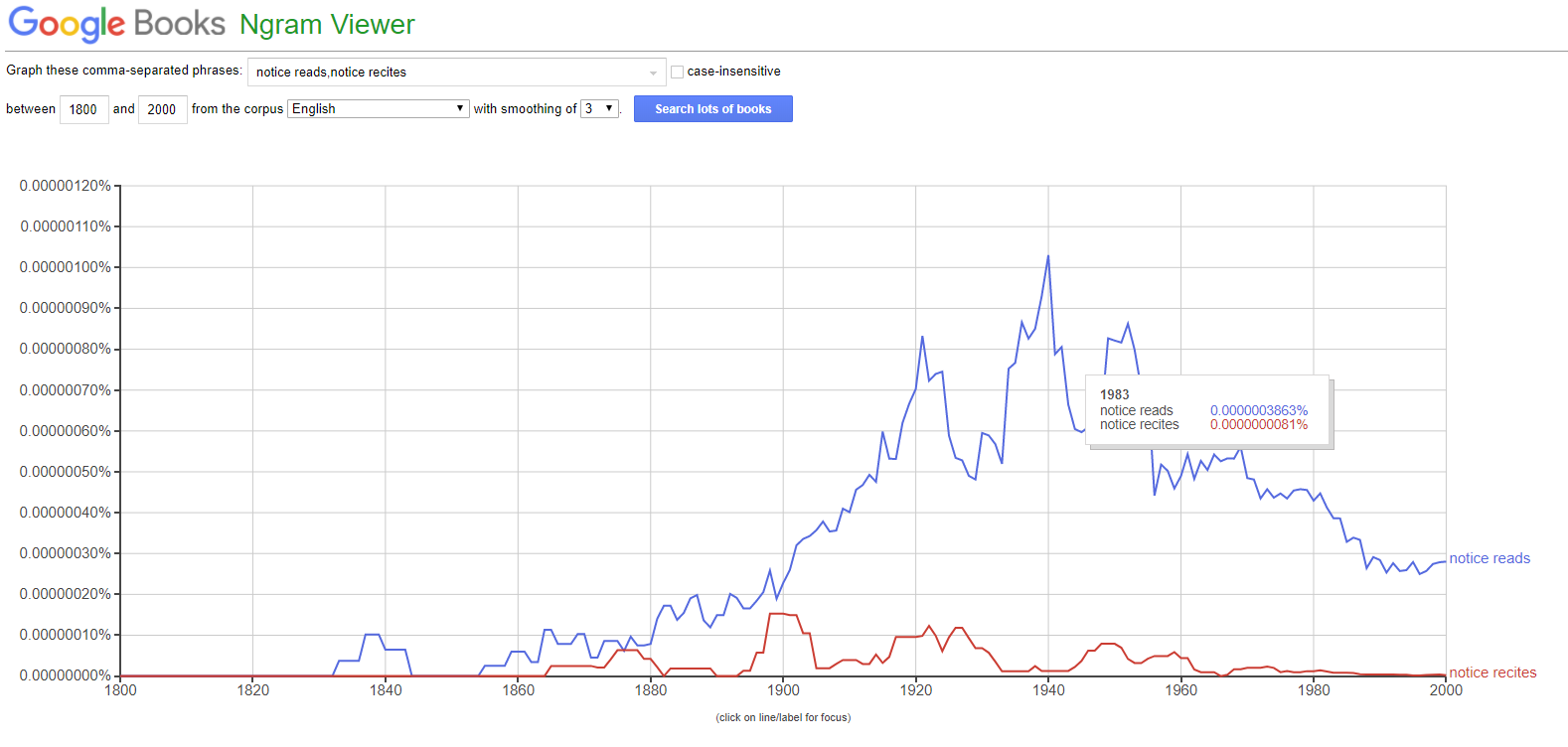To my US English ear, "The notice recites" sounds wrong. I think one recites poetry but the notice itself can't recite anything. I checked with Merriam Webster and it seems to back up my point of view in that it doesn't have a definition that would fit "The notice recites." So I copy-edited an Academia Meta question, changing "recites" to "reads." However, the author rolled it back and was a bit miffed about my edit. He claims the dictionary he consulted backs up his point of view, which is that both are correct. We have agreed to meet here at noon for an ELL showdown. I look forward to seeing what he found in his dictionary.
Question: Does the following sound weird?
The notice recites:
(bla bla etc. etc.)
From Merriam-Webster:
transitive verb
1 : to repeat from memory or read aloud publicly
2 a : to relate in full: recites dull anecdotes
b : to give a recital of: recited a catalog of offenses
3 : to repeat or answer questions about (a lesson)
intransitive verb
1 : to repeat or read aloud something memorized or prepared
2 : to reply to a teacher's question on a lesson
Edit:
I see several meanings given under "read" (again, Merriam Webster) that seem to fit with the way I used "read" when I attempted my edit of the pricklish person's post.
Transitive
6 : indicate: the thermometer reads zero
Intransitive
2 a : to yield a particular meaning or impression when read
b : to be readable or read in a particular manner or to a particular degree: this book reads smoothly
3 : to consist of specific words, phrases, or other similar elements: a passage that reads differently in older versions
Edit2:
The author cited the Oxford English Dictionary, full paywall version. Unfortunately he didn't cite any text from the dictionary or even say which definition(s) he felt back up his point of view.
I took a look. I'm able to find one definition which looks like it could conceivably fit, without being explicitly considered obsolete, historical, literary, archaic, or legal:
Origin: Of multiple origins. Partly a borrowing from French. Partly a borrowing from Latin. Etymons: French receiter; Latin recitare.
Etymology: < Anglo-Norman receiter, receitter, Anglo-Norman and Middle French reciter
trans.
b. To cite or quote (a law, passage, opinion, etc.).
However, the examples still leave me with some doubt. I'll explain in a moment. First, the examples:
1509 H. Watson tr. S. Brant Shyppe of Fooles (de Worde) ii. sig. A*.iiii Ye must recyte and declare good auctorytees of lawe and of decrete.
1570 J. Foxe Actes & Monumentes (rev. ed.) I. 121/2 After that he reciteth the decree which he himselfe made against them.
1621 R. Burton Anat. Melancholy i. ii. i. ii. 70 Some few I will recite in this kinde out of most approoued Phisitians.
1653 H. More Antidote against Atheisme iii. ii. 109 I will briefly recite some few of those many miraculous passages.
1710 H. Prideaux Orig. & Right Tithes iv. 165 The passage of Mathew Paris above recited.
1793 T. Beddoes Observ. Nature Demonstrative Evid. 14 I might recite the opinions of a considerable number of writers.
1832 M. Stuart Comm. Epist. Romans 400 Without delaying to recite different opinions, I would merely say, that..it seems to me plain the question in ver. 20 is to be repeated.
1863 E. A. Hitchcock Red Bk. Appin (2003) 31 Besides the passage just recited from Isaiah, the prophet refers to the same Light in many other places.
1892 G. B. Goode in Ann. Rep. Board of Regents Smithsonian Inst. 1891 iii. 283 The second [bill], reported February 6, recited the opinion—‘That the education of the children..is a duty of solemn and indispensable obligation’.
1985 M. Youssef Revolt against Modernity vii. 49 He recited the example of Bonaparte's invasion of Egypt..to prove his case.
2003 G. W. Jareke & N. K. Plant Seeking Civility vi. 72 The court of appeals recited the law of North Carolina..that the Wilsons would have to show that Pearce's conduct ‘exceed[ed] all bounds of decency’.
The big jump in dates is a red flag but my primary concern is that the examples seem to fit Definition 1 or Definition 2b:
1 trans. Law. To state (a relevant fact) in a deed or other legal document. Also with clause as object.
2b trans. To mention separately or in order (a number or set of things); to give a list or catalogue of; to enumerate, list. In later use passing into sense 5a.
5a trans. To read aloud or repeat from memory (a poem, passage, prayer, etc.), esp. before an audience. Also: to intone (a psalm, canticle, or the like).
Does Definition 4b nevertheless back up the author's use of recite?
2/22/18 The Outcome
I'm awarding the bounty to @sparksbet. Many thanks to all involved, especially
- The author, who came back and explained his point of view ('I consciously used "recite" in a legal and possibly archaic sense').
- 1006a, who commented that the author was apparently "going for a sort of pseudo-legalese feel."
Now I understand both the original word choice and also why my copy edit bothered the author so much.




